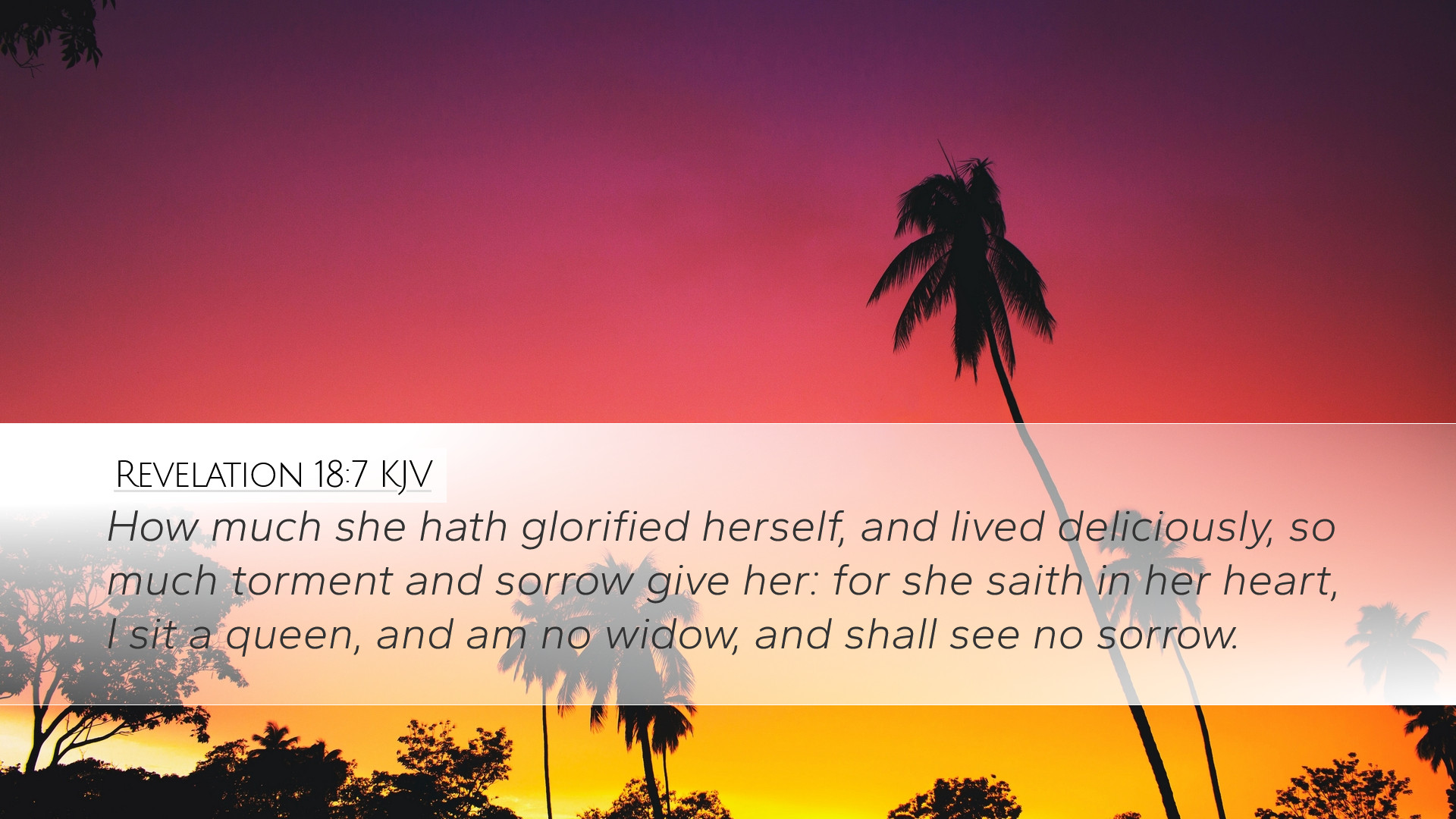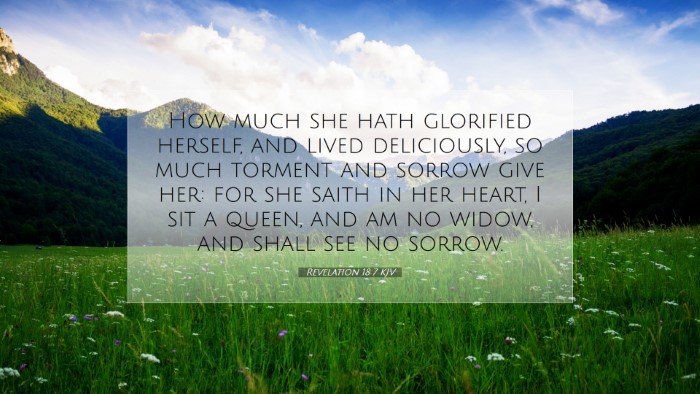Commentary on Revelation 18:7
Revelation 18:7 states: "How much she hath glorified herself, and lived deliciously, so much torment and sorrow give her: for she saith in her heart, I sit a queen, and am no widow, and shall see no sorrow." This verse occurs within a larger context of lamentation over the fall of Babylon, symbolizing the hubris and excessive indulgence of a great city or empire. This commentary seeks to distill insights from several public domain sources, illuminating the theological and practical implications of this text.
Overview of the Verse
In this verse, the personification of Babylon captures the essence of self-glorification and the resultant judgment. The excessive pride of Babylon, described by her luxurious living, has brought about her downfall. The declaration that she is a queen, devoid of widowhood and sorrow, reflects an attitude of invincibility and pride. Yet, the swift counterpoint of torment and sorrow demonstrates the ultimate futility of such arrogance.
Insights from Matthew Henry
Matthew Henry views this verse in the light of the overarching theme of the pride and eventual doom of Babylon. He emphasizes the following points:
- Self-Glorification: Babylon has exalted herself to a state of perceived sovereignty and luxury. This reflects a spirit of rebellion against God, who ultimately presides over all nations.
- Contrast of Proclamation: While Babylon claims to be untouchable ("I sit a queen"), the pronouncement of her impending judgment illustrates how God subverts human pride. Her prosperity will transition into torment.
- God's Justice: Henry insists that God will not overlook the sins of the powerful and proud. The torment promised corresponds to the luxury enjoyed, highlighting the just nature of divine retribution.
Insights from Albert Barnes
Albert Barnes offers additional perspectives on the imagery found in this passage:
- Judgment and Condition: Barnes connects the state of Babylon to the spiritual condition of prideful societies. The verse serves as a warning to other nations about the fate that accompanies self-deification.
- Symbolism of 'Queen': The title "queen" indicates a ruling power that is unrepentant. The assertion of her status, alongside the denial of vulnerability ("I am no widow"), reflects societal blindness to moral decay.
- Contrast between Earthly Glory and Divine Judgment: Barnes points to the ultimate reality that human pride and grandeur will yield to divine judgment. The promise of sorrow serves as a call to humility and recognition of God’s sovereignty.
Insights from Adam Clarke
Adam Clarke provides a critical examination and syntactical analysis of the text:
- Exegesis of 'Deliciously': Clarke examines the Greek term which implies an indulgent and excessive lifestyle, contrasting it with the expected comportment of a believer. The indulgence serves as an indicator of Babylon's corrupt nature.
- Temporal vs Eternal Perspective: Clarke underscores the folly of investing in temporary pleasures. The reward for such a lifestyle is the agony that is contrasted with fleeting enjoyment.
- Message for Believers: Clarke affirms that this warning is not only for Babylon but also a significant reminder for Christians to cultivate a lifestyle of humility, ensuring their priorities align with God's will.
Theological Implications
This verse carries profound theological implications concerning the nature of divine justice, the folly of pride, and the contrast between earthly desires and eternal truths:
- Divine Sovereignty: The insistence on God's judgment against pride and rebellion highlights His sovereign role over creation, reinforcing the idea that none can stand against His authority.
- Call to Repentance: The stark reminder of impending judgment invites us to reflect on our lives and national priorities. The awareness of judgment should stir a collective repentance among believers and nations.
- Esotericism of Wealth and Power: This passage serves as a caution against the allure of wealth and the seductive nature of power, portraying them as potential pitfalls that may lead to a separation from God.
Concluding Reflections
Revelation 18:7 serves as a powerful reminder of the precarious nature of human pride and the certain reality of divine judgment. The commentaries of Henry, Barnes, and Clarke blend a rich tapestry of insight, warning, and hope for both individual believers and broader societies.
As theologians, pastors, and scholars delve into this passage, let it stir a response that fosters humility and reverence for God's sovereignty. Through acknowledging the temporary nature of worldly gains, believers are called to invest in eternal truths, ultimately reflecting the nature of Christ in their lives.


